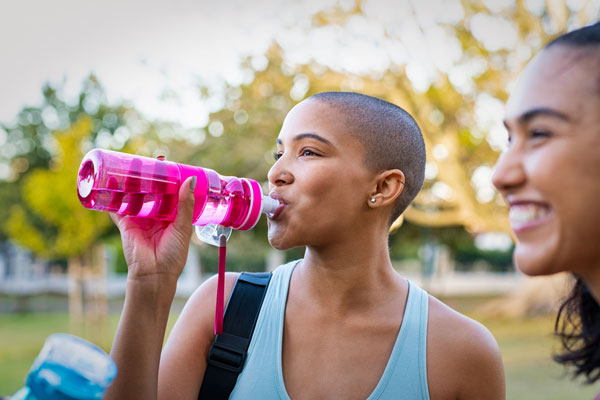Summer is here and so are the warmer temperatures. The warm weather might seem like all sun and fun, but when it’s hot outside, it’s important to stay hydrated. Staying healthy in the summer requires drinking more water than at other times during the year, which is especially important as you age.
As you get older, your body’s water percentage, or proportion of fluid in your body reduces, putting you at higher risk for dehydration. Water is essential for body temperature, maintenance of circulation, ingestion and digestion, role of acting as a lubricant, flushing out urinary tract, removal of waste products from cells and the body, eye health and other important organs. According to research, you have a higher risk of death due to dehydration than to the absence of any other nutrient.
Common signs/symptoms of dehydration include dry mouth, dry tongue, thirst, headache and feeling lethargic. Other symptoms include feeling dizzy, not urinating, having dark yellow urine, dry skin, sunken eyes and rapid heartbeat or breathing.
Anything that is caffeinated will act as a diuretic and dehydrate you. Replacing coffee, caffeinated tea, or soda you normally have with a glass of water is one of the best ways to stay healthy and hydrated.
For an average adult, the recommended fluid intake is 30 mL per kg of body weight, or 1 oz. of fluid per kg of body weight. This means you should be drinking half of your weight in ounces of non-caffeinated beverages to stay properly hydrated.
Tips On How To Increase Fluid Intake:
- Add lemon slices to your water
- Add a decaf herbal tea bag to your water
- Buy a new water bottle that will help increase intake
- Drink seltzer water
- Take off an elastic band from your water bottle each time you finish a bottle until you finished 4 water bottles – this is usually equivalent to about 64 oz. or 8 C of water
- Infuse with berries, pineapple or your favorite fruit
- Infuse with cucumbers and ice for a refreshing drink
- Try to drink half of your intake before lunch and half after lunch
- Set small goals – if you’re used to only drinking a few cups of water, start by drinking one more and slowly increase
Drinking water should be a part of your daily routine, not something you have to go out of your way to do. Behavioral Therapy Services at Behavioral Nutrition put an emphasis on making drinking water regularly a habit because it can go a long way towards maintaining good health. Practicing good habits to make sure you stay hydrated is an important part of how you look and feel all year long but it’s especially important for your health during the summer.



